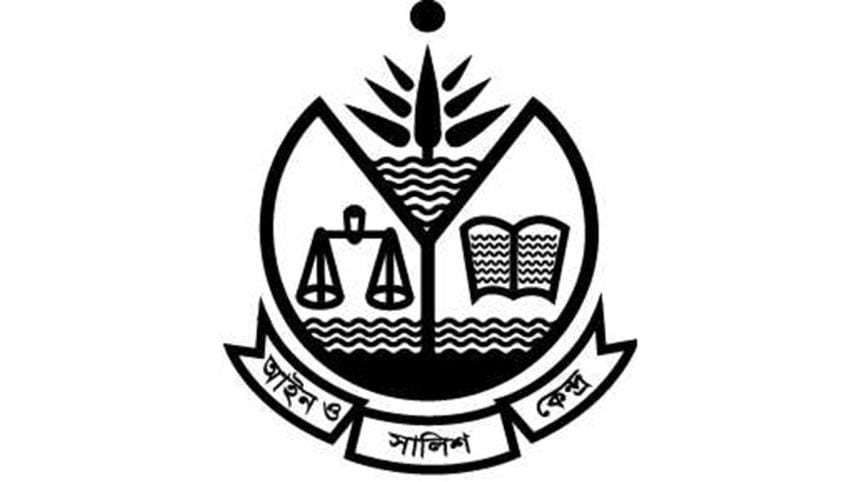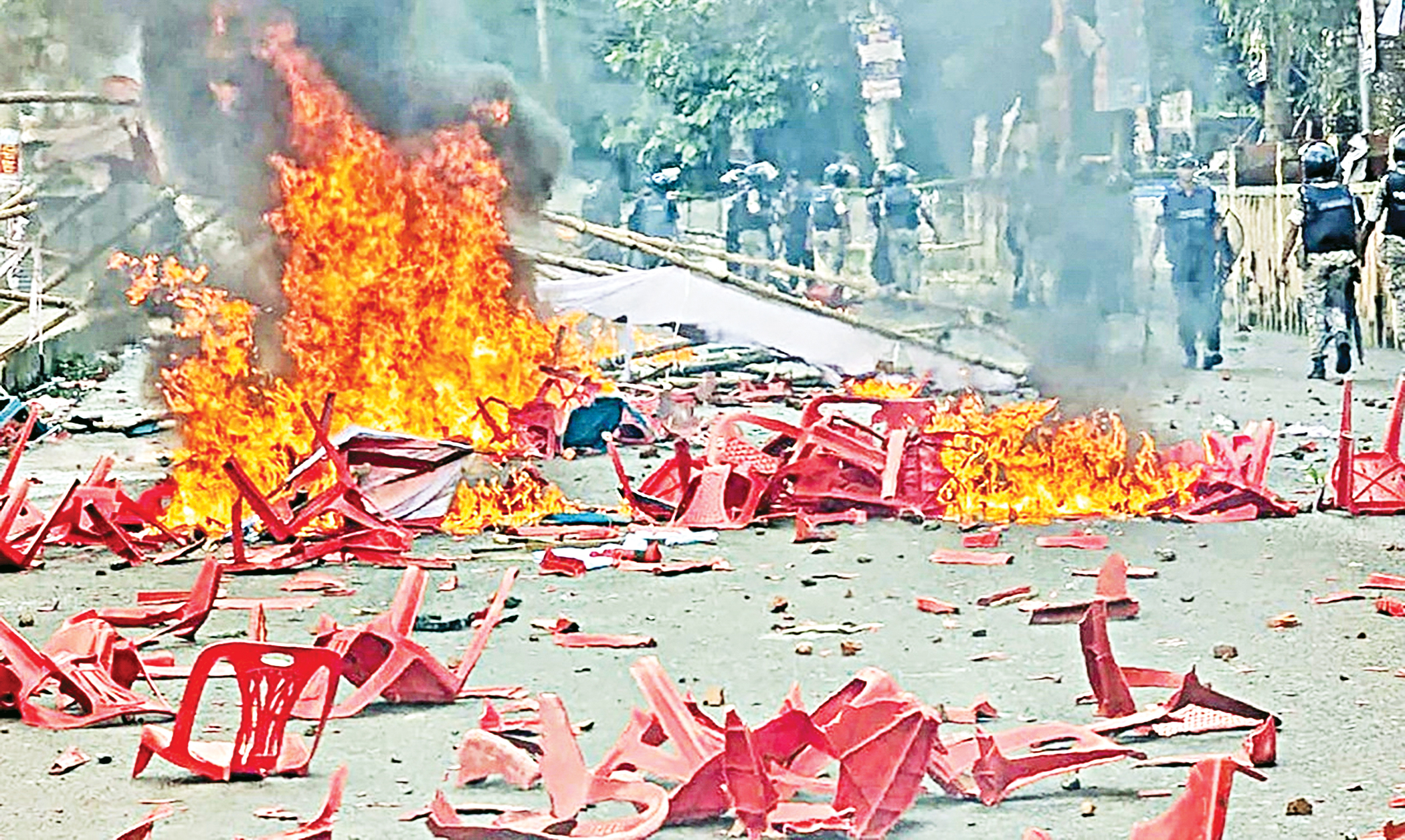Gopalganj violence: ASK finds serious rights violations

- Unlawful killings, mass arrests, and excessive use of force
- Families pressured to bury or cremate bodies without post-mortem
- 18 children among arrestees
Rights group Ain o Salish Kendra has called for an independent and impartial investigation into the deadly violence in Gopalganj on July 16.
"The violence in Gopalganj involved serious violations of human rights, including excessive use of force, denial of the right to peaceful assembly, and harassment of innocent civilians," Ain o Salish Kendra (ASK) said in a report released yesterday.
The report also said the incident, which occurred during a political rally organised by the National Citizen Party (NCP), sparked "grave concerns over allegations of unlawful killings, mass arrests, and excessive use of force".
The violence left five civilians dead and dozens injured.
A four-member team of the rights organisation conducted a field visit on July 21 and 22 in Gopalganj, documenting accounts of family members of the deceased and injured, witnesses, professionals, law enforcers and hospital authorities, as well as prison officials during their investigation.
Pointing to the involvement of multiple law enforcement agencies, the rights group reiterated its demand for justice for the victims and accountability for the perpetrators.
ASK said such state actions "undermine democratic freedoms and fuel fear among ordinary citizens", many of whom have since fled their homes.
Describing the incident, the report said on July 16, around 10:30am, over 50–60 people chanting "Joy Bangla" slogans began vandalising chairs at the NCP rally venue.
NCP supporters, about 150-200 in number, retreated towards the deputy commissioner's (DC) office. The alleged attackers' group fled the scene following police action.
Security was tightened with police and army deployment, and NCP central leaders arrived at the venue under heavy escort around 1:00pm, said the report.
As long as the leaders finished their speeches, which included "derogatory remarks against Bangabandhu Sheikh Mujibur Rahman and the Awami League", violence erupted in different parts of the city, it added.
Awami League supporters began pelting stones at security personnel, leading to the law enforcers using stun grenades, tear gas, and live ammunition, the ASK report said, citing eye-witnesses.
Witnesses confirmed to the ASK delegation that while the attackers used stones and crude weapons, no firearms were seen among them.
However, law enforcers fired live bullets indiscriminately, the report said.
Of those injured by bullets, four were declared dead at Gopalganj General Hospital, while a fifth victim, Ramzan Munshi, died later at Dhaka Medical College Hospital.
Families of the deceased -- Imon Talukder, 17, Ramzan Kazi, 18, Deepto Saha, 25, Sohel Molla, 32, and Ramzan Munshi -- alleged that the bodies were hurriedly handed over by the hospital authorities with pressure to bury or cremate them without post-mortem examination.
Except for Ramzan Munshi, none of the dead bodies initially underwent a postmortem.
Witnesses and family members told ASK that Imon, who worked at a crockery shop and had no political affiliation, had been brutally beaten, even stomped on the face, by security forces.
The report said footage of violence targeting Imon circulated widely online.
His family confirmed visible bullet wounds and injuries on his face and body.
After media outcry over the lack of autopsies, on July 20, police reportedly contacted families, excluding Deepto Saha's, to exhume the bodies for postmortem examinations.
On July 21, ASK representatives were present during the exhumation and inquest of Imon and Ramzan Kazi.
Families called the process a form of secondary harassment and reiterated their demand for justice.
One injured person said during an interview at the hospital that he was shot in the stomach and hand while riding a motorised rickshaw to work.
His finger was amputated as a result. He, too, claimed to have no political affiliation.
The ASK report said that 18 children had been arrested by July 21, some under the Anti-Terrorism Act, 2009.
Family members claimed these minors had no connection to the clashes.
By July 21, a total of eight cases had been filed related to the violence, with 5,400 persons charged, of whom 358 were named, including three women and 32 members of the Hindu minority community.
Three of the cases were filed under the Anti-Terrorism Act, one under the Special Powers Act, 1974, and others under penal codes.
Police filed cases over the deaths of Ramzan Kazi and Deepto, saying the victims' families declined to file complaints.
However, ASK said family members denied being contacted by police for legal proceedings.
The report also said there were arbitrary arrests of civilians, even from areas unaffected by the clashes. Accusations of extortion by threatening arrest also surfaced.
Following the violence, a curfew and Section 144 of the Code of Criminal Procedure, which bars gathering, were imposed.
The ASK cited prison officials saying 150 detainees were transferred to other districts due to overcrowding.
On July 21, the Gopalganj District Jail had 751 detainees, despite having a capacity to house 348.
Prison officials told ASK that a mob attacked the jail on July 16 around 3:00pm, damaging its perimeter, guardroom, and visitor areas, and attempted to breach the armoury.
Jail guards fired 80 rounds of warning shots to deter the attackers, the report said, citing prison officials. The army later brought the situation under control.
The ASK team reportedly faced rude behaviour from the officer-in-charge at Gopalganj Sadar Police Station when they went there to get his account regarding the incident.
The district's superintendent of police said security forces exercised "maximum restraint" and did not use lethal weapons, although evidence suggests otherwise, according to the ASK report.
He confirmed the deployment of APCs and acknowledged arresting 177 people as of July 20, some under section 54 of the CrPC, which allows arrest on suspicion.
ASK said its attempts to meet with army officials were unsuccessful.
On July 22, when they approached Captain Sakib near the DC office, he declined to speak, citing VIP duties.
Later, ASK attempted to contact him by phone, as he suggested, but also failed.



 For all latest news, follow The Daily Star's Google News channel.
For all latest news, follow The Daily Star's Google News channel. 

Comments